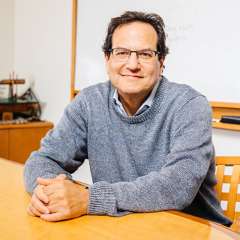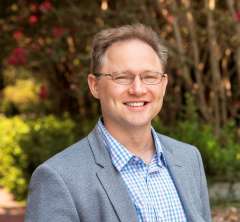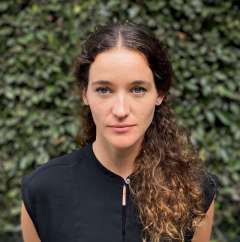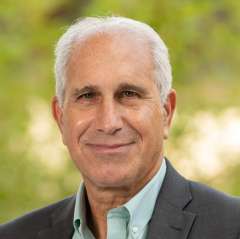Speakers
Keynote Speaker

Guillermo Sapiro, PhD
You are wearing the true and impactful AI revolution
Guillermo Sapiro was born in Montevideo, Uruguay, on April 3, 1966. He received his B.Sc. (summa cum laude), M.Sc., and Ph.D. from the Department of Electrical Engineering at the Technion, Israel Institute of Technology, in 1989, 1991, and 1993 respectively. After post-doctoral research at MIT, Dr. Sapiro became a Member of Technical Staff at the research facilities of HP Labs in Palo Alto, California. He was with the Department of Electrical and Computer Engineering at the University of Minnesota, where he held the position of Distinguished McKnight University Professor and Vincentine Hermes-Luh Chair in Electrical and Computer Engineering. From 2012 to 2025 he was a James B. Duke School Professor with Duke University.
Speakers

Carrie Bearden, PhD
Individual risk calculators for clinical high risk youth
Dr. Carrie Bearden received her Ph.D. in Clinical Psychology from the University of Pennsylvania. She completed her clinical internship at the San Diego VA Medical Center and UCSD Child & Adolescent Psychiatry Services. Dr. Bearden joined the UCLA faculty in the Department of Psychiatry & Biobehavioral Sciences at UCLA in 2003. Currently, she is a Professor in the Semel Institute for Neuroscience and Human Behavior and Brain Research Institute, with a joint appointment in the Department of Psychology. Dr. Bearden’s research aims to understand neurobiological risk factors for the development of serious mental illness in youth, using converging methods to study cognition and neuroanatomy in clinical high-risk cohorts (e.g., adolescents with early symptoms of psychosis), and in highly penetrant genetic conditions , particularly 22q11.2 mutations.

Michelle Craske, PhD
Precision Mental Health for Psycotherapies
Michelle G. Craske, PhD, is co-director of the UCLA Depression Grand Challenge. She pioneered the STAND system of care and oversees its execution in its capacities as DGC research as well as standalone treatment at UCLA and, from 2021-2023, East Los Angeles College. She also leads the UCLA STAND for Community Colleges Innovation Center. Craske’s research aligns closely with the Depression Grand Challenge’s aim to understand the causes of depression and develop more effective treatments for depression. She studies how environmental factors, biological factors and neurocircuitry influence the risk of developing anxiety and depression.

Lea Davis, PhD
The PsycheMERGE Network: Advancing Precision Psychiatry Research Through EHR-linked Genomics
Lea K. Davis, PhD is a Professor of AI and Human Health, Medicine, Psychiatry, and Genetics and Genomics. She is the contact-PI for the PsycheMERGE Network and the Scientific Director of the Mount Sinai Million Health Discoveries Program (MSMHDP), a flagship initiative of Mount Sinai that aims to enroll 1 million patients into an EHR-linked biobank that will serve as an engine of discovery for the Mount Sinai learning healthcare system. Dr. Davis’s research spans multiple domains of medicine and psychiatry from neurodevelopmental disorders to womens’ health and employs a population level approach to investigate the genetic basis of a wide range of complex health conditions. In addition to her work on complex trait genomics, Dr. Davis has a long-standing commitment to furthering social justice through science, research ethics, genomic privacy, and responsible data sharing.

Nelson Freimer, MD
Digital phenotyping for precision mental health
Dr. Nelson Freimer is Director of UCLA’s Depression Grand Challenge, a campuswide initiative that aims to cut the burden of depression in half by 2050. He is Maggie G. Gilbert Endowed Chair, Distinguished Professor of Psychiatry and Human Genetics, and Director of the Center for Neurobehavioral Genetics. He also directs the UCLA Neuroscience Genomics Core, Dr. Freimer received an M.D. degree from the Ohio State University, and completed residency training in psychiatry (at UC San Francisco) and a postdoctoral fellowship in human genetics (at Columbia University). He joined the UCLA faculty in 2000 after 10 years on the faculty at UC San Francisco.

Boris Heifets, MD, PhD
Deconstructing powerful psychotropic drugs to make better medicine
Dr. Boris Heifets is a neuroanesthesiologist and Associate Professor in the Department of Anesthesiology, Perioperative and Pain Medicine at Stanford University. He directs both clinical and basic neuroscience research programs, bridging neuroscience, psychiatry and anesthesiology. His research is focused on deconstructing the neural mechanisms involved in an emerging class of rapid-acting psychiatric therapies, like ketamine, MDMA, psilocybin and propofol. His group’s work is leading to new insights into the therapeutic potential of non-ordinary states of consciousness.

Conor Liston, MD, PhD
Probing and Rescuing Dysfunctional Brain Circuits in Depression
Conor Liston, MD, PhD is a Professor of Neuroscience and Psychiatry at Weill Cornell Medicine. The long-term goals of his research program are to define basic mechanisms by which prefrontal cortical brain circuits support learning, memory, and motivation, and to understand how these functions are disrupted in depression, OCD, and other neuropsychiatric disorders. His team is also developing neuroimaging technologies for informing psychiatric diagnosis in human populations and predicting treatment response to transcranial magnetic stimulation and other forms of therapeutic neuromodulation.

Loes Olde Loohuis, PhD
Advancing precision psychiatry through EHR-linked biobanks
Loes Olde Loohuis is Assistant Professor-in-Residence in Psychiatry and Biobehavioral Sciences. Her research focuses on elucidating the underlying molecular mechanisms of severe mental illness, by utilizing and developing computational approaches to leverage multi-level data. Prior to joining UCLA as faculty she was a postdoctoral fellow at UCLA’s Center for Neurobehavioral Genetics, during which time she was awarded a K99/R00 award to identify electronic health record and genetic signatures that predict which patients with depression will develop bipolar disorder.

Robert Malenka, MD, PhD

Sophia Vinogradov, MD
Personalized Treatment for Early Psychosis: What Do We Know and What Do We Still Need to Learn?
Dr. Sophia Vinogradov is the Donald W. Hastings Endowed Chair in Psychiatry and Department Head of Psychiatry and Behavioral Sciences at the University of Minnesota Medical School. Sophia directs a translational clinical neuroscience laboratory focused on cognitive dysfunction in psychosis, with an emphasis on both mechanistic and practice-based research. She is the Co-PI of an NIMH P50 Conte Center on "Dysfunctional State Representations in Psychosis" and of a regional NIMH EPINET hub for learning healthcare system research in early psychosis (part of the national Early Psychosis Intervention Network).